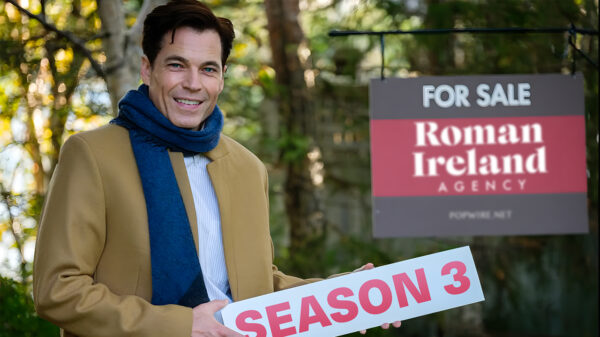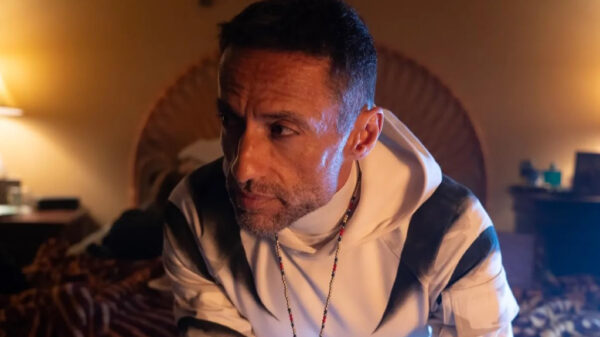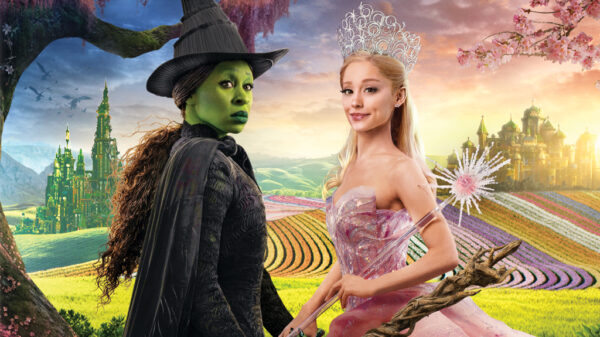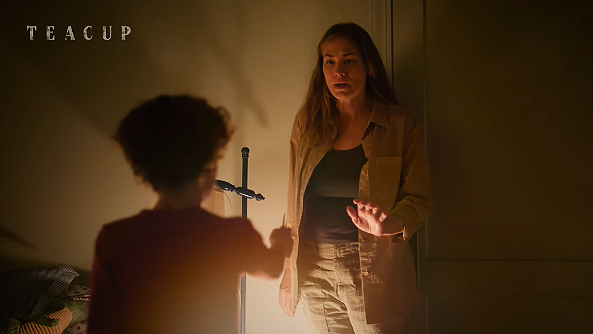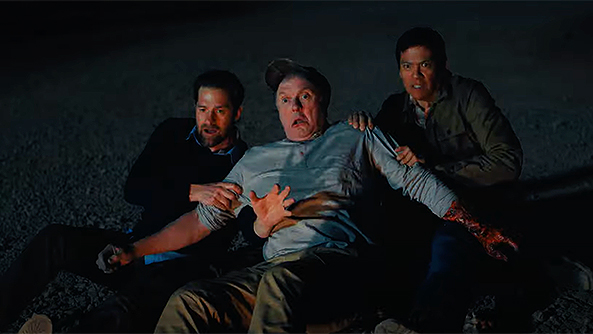Creator-showrunner Eliot Laurence and his team of writers conjured a rich story world within Freeform’s supernatural drama, Motherland: Fort Salem. Between the alternate world reality and fascinating witch lore, there are many intricate details and relevant allegories to explore and contemplate. The character development and arcs of the series’ lead and recurring characters are two prominent examples of the spectacular storytelling in Motherland, most notably, the powerful portrayal of women. Among the witchy drama’s well-developed characters is the formidable General Petra Bellweather played by Catherine Lough Haggquist. In an exclusive interview with PopWire, Catherine discusses Petra’s journey, Motherland’s empowering representation of women, and the message she hopes fans will carry with them.
General Petra Bellweather saw a transformative journey over the course of Motherland: Fort Sale’s three seasons with Freeform. When Petra is introduced in the series’ pilot episode “Say the Words”, her devotion to her family, the Bellweather legacy, and her duty to her country as a soldier lays out the framework upon which her character was built. Catherine describes Petra’s devotion to the Army as an “extension of her commitment to her family.” “We can see the foundations for [Petra] excelling in service being her paying the highest tribute to her family’s legacy and care-taking that legacy… They’re actually quite enmeshed and I think that’s also why that informs her mothering style and why she wants that greatness for her daughter [Abigail],” Catherine explains.
In Season 2, Petra is sworn to General of the US Army at the onset of the Great War and met with an ever-evolving enemy, the Camarilla, that challenges her strict ethical codes within the military for the duration of the show. “I think the lines get blurred when [Petra] has to start to question for herself what she thought she knew about the Army… When she starts to see Alder, who would have been her hero since childhood, starting to bend the rules to suit the political needs of the moment from her perspective… that starts a chain of events for Petra where she starts to reconsider things,” says Catherine. “It shifts [Petra] off of what was just ‘the way things are done’ into her evolution, taking her to a new place where the next best thing is meeting her.” As someone who is responsible for the lives of her people, witches and non-witches alike, the general must weigh “how does she save the most lives [and] how does she do the most ‘good’” – two critical features of great leadership.
While discussing the empowering representation of women in the show, Catherine points out that “women are written with texture and… not as token emblems of a specific place on the continuum of womanhood.” General Petra Bellweather is a model illustration of the show’s multifaceted women characters as she balances her role as a leader, mother, daughter, partner, and friend – a relatable experience for many women in the real world. “I admire Petra. I admire the way that she is written and crafted and allowed to evolve,” expresses Catherine. “I think that so often,… women in power tend to be written quite two-dimensionally and that they are only seen through the lens of their accomplishment and not through the challenges of trying to maintain all of the plate-spinning… The fact that we get to see her navigate all of these fronts and not just have easy answers from the one that she’s good at… is a really effective way this story is told and I’m so grateful the writers gave her so much texture.”
RELATED | “Motherland: Fort Salem” After Show – Series Finale ‘Revolution Part 2’ Discussion
Catherine also highlights the importance of having women of all ages contributing to Motherland: Fort Sale’s story. “The dynamics between the women [being] generational… [is] really important because… so much of our media is so segmented and I don’t think we see images of women of different ages in the same space regularly together or on the same task,” says Catherine. “The Biddies were such an important part of the first two seasons in terms of that visual of women of different ages all sharing the same space and working with their very talents towards common goals,” she continues. “It’s important that this is a world where women aren’t put out to pasture when they hit a certain age. Increasingly, that’s a conversation that needs to be had because ageism is still one of the last… accepted prejudices.” Catherine adds that ageism “robs us of so much richness and wisdom that if we can create that respectful traction, we could benefit so much from it.”
Along with uplifting and authentic representation of women, Motherland’s story highlights xenophobia and the hatred that ensues. With this important and pertinent theme in mind, Catherine expresses her hope that viewers and fans can see how “diversity is a strength not a threat” . “More voices and perspectives on an issue give us more options for solution,” Catherine explains. “Evolution of thought and idea is crucial to our survival and coexistence… We should be hearing a wide range of thoughts and ideas as we navigate the challenges that the globe faces right now.”
Catch our PopWire exclusive interview with Catherine Lough Haggquist below to hear about the evolution of Petra’s relationship with her daughter Abigail (Ashley Nicole Williams) and how the dynamic between Catherine and her co-star Ashley evolved in parallel. You also do not want to miss Catherine’s heartwarming “thank you” to the Motherland: Fort Salem fandom.
Stream all three seasons of Motherland: Fort Salem on Hulu.
Dani grew up on the West Coast in sunny California. With a passion for film and television, she’s always on the hunt for binge-worthy flicks with diversity and positive representation of Womxn, the LGBTQIAN+ community, and other marginalized groups. Favorite genres include supernatural dramas, sci-fi, fantasy, horror and magical realism. Dani’s current favorite shows are Motherland: Fort Salem, Killing Eve, Dickinson, and Euphoria.


